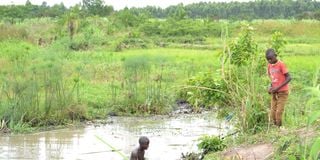Nakasongola accuses govt of delaying to resurvey wetland

Children play at a section of the Lubenge wetland in Nakasongola District. Some investors have taken part of the wetland. PHOTO/ FILE
What you need to know:
Authorities claim the delay has put livelihoods of more than 20,000 farmers who derive their livelihood from the water catchment area at risk.
The authorities in Nakasongola District have accused government of delaying to resurvey Lubenge transborder wetland, part of which is being claimed by some investment companies.
In 2018, the district leaders instituted an ad hoc committee to investigate the alleged parcelling out of large chunks of land and degrading activity at the more than 10-square mile Lubenge wetland that the district shares with Luweero and Nakaseke.
Acting on the findings and recommendations of the committee, the district council advised the ministries of Lands, and that of Water and Environment to resurvey and redraw boundary marks in the wetland.
The wetland has adversely been depleted thus affecting water flow at Lugogo drainage channel.
The committee report also called for cancellation of all land titles issued on land in the Lubenge wetland.
It further advised all investment companies and private developers to restore the wetland ecology, which has affected the weather condition in the district.
However, Mr Sam Kigula, the district chairperson, said the recommendations that the district council passed in regard to the illegal activities in Lubenge wetland have not been implemented.
Mr Kigula said the delay has put livelihoods of more than 20,000 farmers who derive their livelihood from the water catchment area at risk.
“We have not moved any big step in regard to our desire to save the Lubenge transborder wetland from complete destruction. We had sought government intervention with a request that the wetland be resurveyed and new boundary lines drawn, but this is yet to be effected,” he said on Monday.
He said the illegal parcelling out of the wetland land was done by their counterparts in Luweero who never consulted them in all the processes.
“Our major concern as people of Nakasongola was about the future of the hundreds of farmers whose livelihoods had already been affected by the degradation at the Lubenge wetland where some of the drainage channels, including the water catchment area, is getting destroyed. We handed over our report to the land inquiry commission that was headed by Justice Catherine Bamugemereire,” he said.
Mr Simon Musana, a farmer at Kakooge Sub-county in Nakasongola is counting losses as a result of reduced water levels in Lubenge wetlands.
“Most of the individuals and investment companies that have acquired land at Lubenge wetland have their own plans and purpose for which they acquired the land,” Mr Musana said.
“Several are involved in land-filling for construction of factories and others are carrying out excavation and water diversion. The Lugogo water drainage that used to supply enough water to areas around Kakooge is now dry. We now have to wait for the rain,” he added.
Setback
Mr Sam Butagasa, a district councillor and chairperson of the natural resources committee at Nakasongola council, said the Covid-19 pandemic affected progress in stopping degradation.
“I believe that the wetland encroachers at Lubenge must be relieved for now that the Covid-19 pandemic made it difficult for the district to pursue the different means to cause action against them. But this is not the end. We handed over the documents to competent government entities. We shall make a follow up soon,” Mr Butagasa said.
Mr Kigula said farmers in the district are directly affected by the degradation activities.
“When we successfully resurvey and demarcate this wetland, this will give Nakasongola a better chance to fight for the protection of the wetland. It is hard to fight this battle when you do not know the size and boundary of the area that you are trying to protect,” he added.
Efforts to speak to Mr Denis Obbo, the spokesperson Ministry of Lands, were futile as our repeated calls to his telephone numbers went unanswered.
Nakasongola authorities originally protested the investment plan on grounds that the project was handled by the Luweero authorities without involving them.
Background
The Lubenge transborder wetland once acted as a catchment area for the Lugogo River and greenbelt before the advent of investment companies and private developers.
In April 2016, President Museveni commissioned an Agricultural Industrial Park on 927 acres at Lubenge wetland. The Shs737b Chinese investment project was supposed to promote poultry farming and rice growing as well as employ more than 25,000 residents from Luweero and Nakasongola districts.
However, Nakasongola raised the red flag over the continued diversion of the River Lugogo drainage system by the investors. The authorities claimed the diversion of water through excavation works by Kehong China-Uganda Industrial Park at the wetland had left livestock and farmers at Kakooge, Wabinyonyi and Nakitoma sub-counties without enough water, with several investment firms, including Rhino Sanctuary and Nile Fibre Industries, also affected.
“We are yet to resolve the water crisis as a result of diversion of the Lugogo drainage, despite the many letters written to the National Environment Management Authority (Nema ) for intervention,” Mr Kigula, said then.
He added: “We decided to involve Nema because the Chinese firm was reportedly licensed to conduct its activities, despite earlier resistance from the district environment team that had already sensed trouble once the wetland is allocated for unfriendly use.” Mr Tonny Achidria, the Nema spokesperson, said: “We are planning a meeting with the stakeholders over the same. This is a compliance issue that requires continuous monitoring from the district environment officers because they are on the ground. After the meeting, the resolutions and way forward will be shared.”



